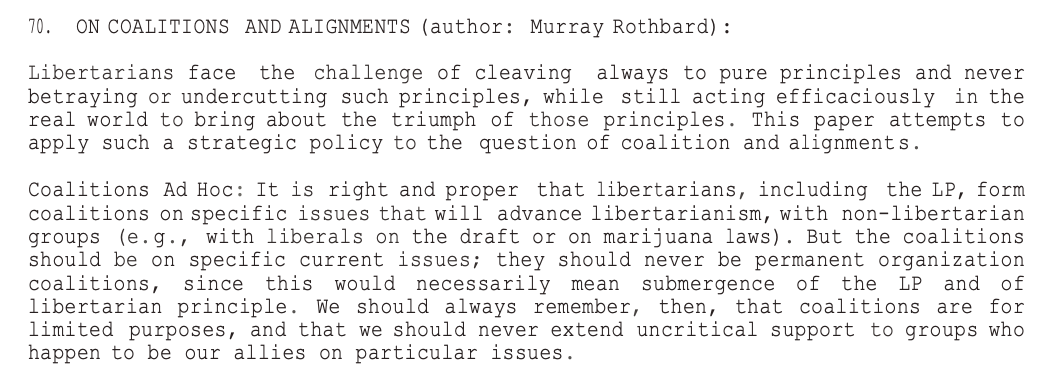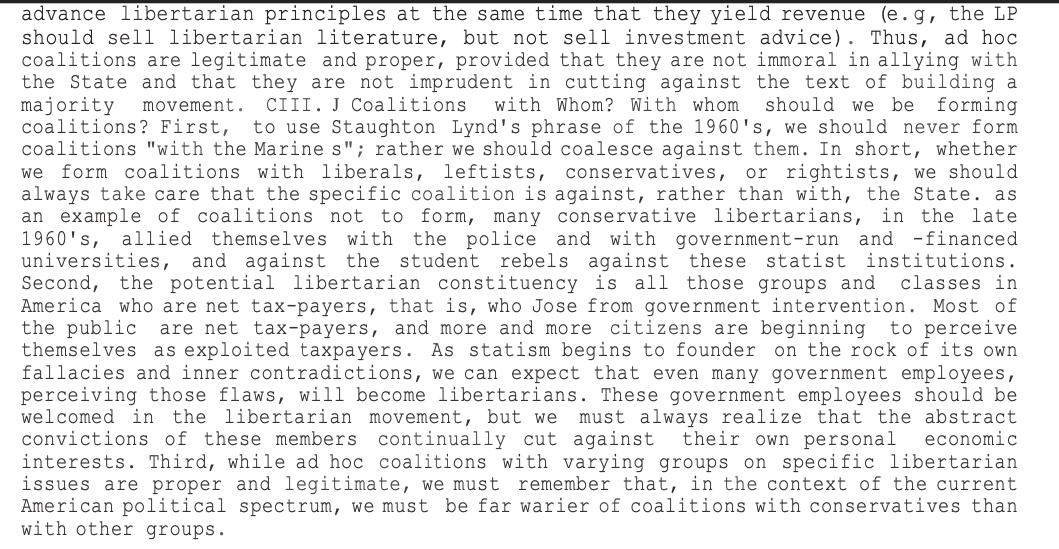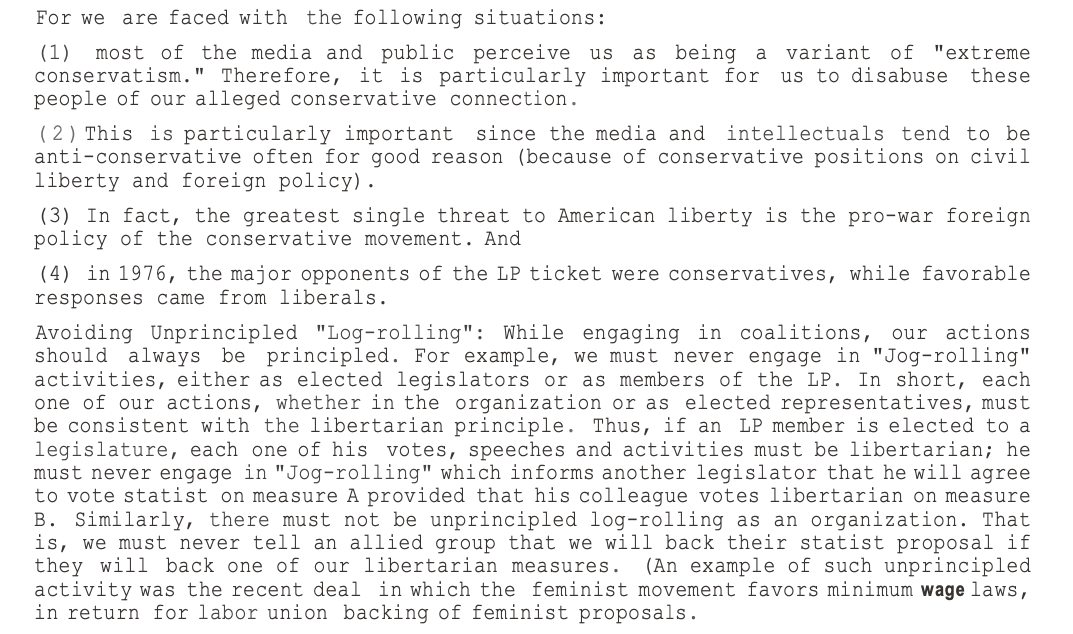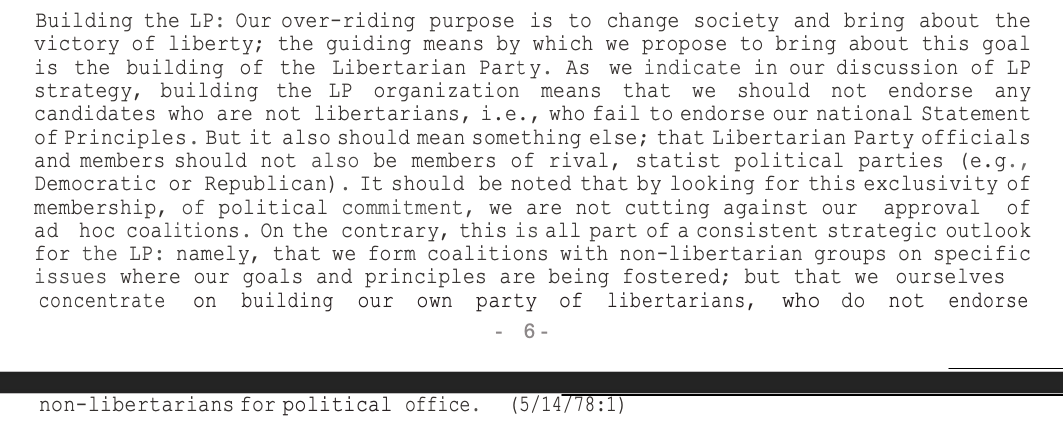Document:LNC Resolution 14 May 1978 Regarding Coalitions and Alignments
Jump to navigation
Jump to search
Resolved at the May 14, 1978 LNC Meeting:
ON COALITIONS AND ALIGNMENTS (author: Murray Rothbard):
Libertarians face the challenge of cleaving always to pure principles and never betraying or undercutting such principles, while still acting efficaciously in the real world to bring about the triumph of those principles. This paper attempts to apply such a strategic policy to the question of coalition and alignments.
Coalitions Ad Hoc: It is right and proper that libertarians, including the LP, form coalitions on specific issues that will advance libertarianism, with non-libertarian groups (e. g., with liberals on the draft or on marijuana laws). But the coalitions should be on specific current issues; they should never be permanent organization coalitions, since this would necessarily mean submergence of the libertarian principle. We should always remember, then, that coalitions are for limited purposes, and that we should never extend uncritical support to groups who happen to be our allies on particular issues.
Relations with allies: Membership, activities, Revenue: Is it legitimate for LP organizers and activists to speak at forums or platforms provided by non-libertarian organizations, whether they be allies or other? The answer should be yes, there is no reason to avoid use of such public platforms, with one prudential proviso. That proviso is that it might be unwise to speak before a forum so out of public favor that they might militate against the LP goal of becoming a majority movement in America (e.g., speaking before the Ku Klux Klan, the CIA or the Mafia). A more difficult question: is it legitimate for LP organizers and activists to join (either as rank and file or board members) organizations with whom we have ad hoc coalitions? The answer should be yes, since we are here dealing with individual memberships, rather than permanent membership by the LP as a whol e. Such a membership would be particularly worthwhile where the activist can have significant impact on the policies and programs of the allied organization. (Examples of such organizations might be the ACLU or NORML). Assuming that this organization is not the State, we still have a prudential pro vi so: that it might be imprudent for the LP activists to join an organization that is out of public favor, or that has a public image of being anti-libertarian, so that we would seem inconsistent (e. g., the Ku Klux Klan or the Mafia). An allied question: whose monetary contribution should the LP accept? Should it turn any contribution down? recognizing that no organization can be expected to engage in the lengthy investigation of the remote source of every dollar, we conclude with similar guidelines to the previous issues: namely, that we should accept any money preferred, with two provisos. One, the moral proviso -- that we accept no money from the State, whether the CIA or the federal elections machinery. And second, the prudential proviso -- that we should refuse any money the acceptance of which would seriously embarrass us in our political goal of becoming a majority movement (again, the Mafia or the Ku Klux K l an). On the money question, we might add that if the LP engages in any money-making activity, the activities themselves should advance libertarian principles at the same time that they yield revenue (e. g., the LP should sell libertarian literature, but not sell investment advice). Thus, ad hoc coalitions are legitimate and proper, provided that they are not immoral in allying with the State and that they are not imprudent in cutting against the text of building a majority movement. CIII. J Coalitions with Whom? With whom should we be forming coalitions? First, to use Staughton Lynd's phrase of the 1960s, we should never form coalitions "with the Marines"; rather we should coalesce against them. In short, whether we form coalitions with liberals, leftists, conservatives, or rightists, we should always take care that the specific coalition is against, rather than with, the State. as an example of coalitions not to form, many conservative libertarians, in the late 1960s, allied themselves with the police and with government-run and -financed universities, and against the student rebels against these statist institutions. Second, the potential libertarian constituency is all those groups and classes in America who are net tax-payers, that is, who Jose from government intervention. Most of the public are net tax-payers, and more and more citizens are beginning to perceive themselves as exploited taxpayers. As statism begins to founder on the rock of its own fallacies and inner contradictions, we can expect that even many government employees, perceiving those flaws, will become libertarians. These government employees should be welcomed in the libertarian movement, but we must always realize that the abstract convictions of these members continually cut against their own personal economic interests. Third, while ad hoc coalitions with varying groups on specific libertarian issues are proper and legitimate, we must remember that, in the context of the current American political spectrum, we must be far warier of coalitions with conservatives than with other groups.
For we are faced with the following situations:
(1) most of the media and public perceive us as being a variant of "extreme conservatism." Therefore, it is particularly important for us to disabuse these people of our alleged conservative connection.
(2)This is particularly important since the media and intellectuals tend to be anti-conservative often for good reason (because of conservative positions on civil liberty and foreign policy).
(3) In fact, the greatest single threat to American liberty is the pro-war foreign policy of the conservative movement. And
(4) in 1976, the major opponents of the LP ticket were conservatives, while favorable responses came from liberals.
Avoiding Unprincipled "Log-rolling": While engaging in coalitions, our actions should always be principled. For example, we must never engage in "Jog-rolling" activities, either as elected legislators or as members of the LP. In short, each one of our actions, whether in the organization or as elected representatives, must be consistent with the libertarian principle. Thus, if an LP member is elected to a legislature, each one of his votes, speeches and activities must be libertarian; he must never engage in "Jog-rolling" which informs another legislator that he will agree to vote statist on measure A provided that his colleague votes libertarian on measure B. Similarly, there must not be unprincipled log-rolling as an organization. That is, we must never tell an allied group that we will back their statist proposal if they will back one of our libertarian measures. (An example of such unprincipled activity was the recent deal in which the feminist movement favors minimum wage laws, in return for labor union backing of feminist proposals.
Building the LP: Our over-riding purpose is to change society and bring about the victory of liberty; the guiding means by which we propose to bring about this goal is the building of the Libertarian Party. As we indicate in our discussion of LP strategy, building the LP organization means that we should not endorse any candidates who are not libertarians, i.e., who fail to endorse our national Statement of Principles. But it also should mean something else; that Libertarian Party officials and members should not also be members of rival, statist political parties (e.g., Democratic or Republican). It should be noted that by looking for this exclusivity of membership, of political commitment, we are not cutting against our approval of ad hoc coalitions. On the contrary, this is all part of a consistent strategic outlook for the LP: namely, that we form coalitions with non-libertarian groups on specific issues where our goals and principles are being fostered; but that we ourselves concentrate on building our own party of libertarians, who do not endorse non-libertarians for political office.
Note: This was indexed in an official Resolution Index and identified as Resolution 69 therein.




